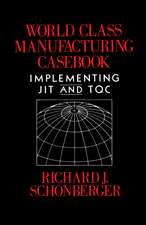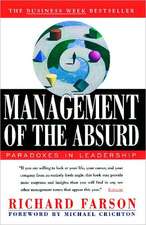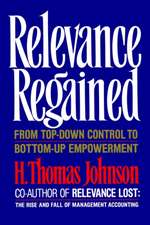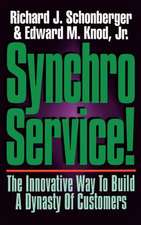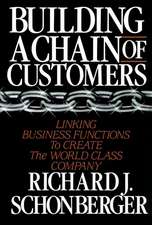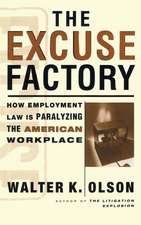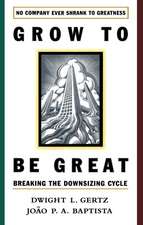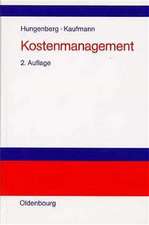World Class Manufacturing: Building Power, Strength, and Value
Autor Richard J. Schonbergeren Limba Engleză Paperback – 3 mai 2013
Schonberger's pathbreaking new research reveals that, from 1950 to 1995, while "financials" dipped and soared repeatedly, industrial decline and ascendancy correlated perfectly with inventory turnover -- one of two key nonfinancial indicators and a bedrock measure, along with customer satisfaction, of a company's power, strength, and value. In this immensely readable book, he captures these new metrics -- the true predictions of future success -- in 16 customer-focused principles created from self-scored reports supplied by over 100 pioneering manufacturers in nine countries. Armed with new world-class benchmark data, Schonberger redefines excellence in terms of competence, capability, and customer-focused, employee-driven, data-based performance.
For front-tine associates to senior executives, Schonberger has written manufacturing's action agenda for the next decade. This book will be indispensable reading for manufacturing and general managers in all industries, as well as for pension fund managers, institutional investors, stock analysts, and stockbrokers.
| Toate formatele și edițiile | Preț | Express |
|---|---|---|
| Paperback (2) | 111.53 lei 3-5 săpt. | |
| Free Press – 3 mai 2013 | 111.53 lei 3-5 săpt. | |
| Free Press – 23 ian 2008 | 129.69 lei 3-5 săpt. |
Preț: 111.53 lei
Nou
Puncte Express: 167
Preț estimativ în valută:
21.34€ • 23.18$ • 17.93£
21.34€ • 23.18$ • 17.93£
Carte disponibilă
Livrare economică 01-15 aprilie
Preluare comenzi: 021 569.72.76
Specificații
ISBN-13: 9781476747347
ISBN-10: 1476747342
Pagini: 288
Dimensiuni: 155 x 231 x 23 mm
Greutate: 0.34 kg
Editura: Free Press
ISBN-10: 1476747342
Pagini: 288
Dimensiuni: 155 x 231 x 23 mm
Greutate: 0.34 kg
Editura: Free Press
Notă biografică
Richard J. Schonberger
Cuprins
Contents
Preface
1. Industrial Decline and Ascendancy
Manufacturing Performance: Down, Then Up
Sustained Improvement
U.S. Manufacturers
French Manufacturers
Obstacles and Openings
Customer Service
Broad-Based Customer Data
Pooled Customer Data
Summing Up
Eras
Japan Decade, American Decade, Global Decade
2. Building Strength Through Customer-Focused Principles
From Edicts to Principles
Customer-Focused Principles
General Principles
Design
Operations
Human Resources
Quality and Process Improvement
Information for Operations and Control
Capacity
Promotion and Marketing
3. Best Manufacturers: How They Rate
Research Project
Scores, by Category
High and Lower Scores
Intermediate Scores
Bottom Group
Sector Scores
Forging Ahead
4. Improvement Pathways
1. Gates Rubber, Denver
2. Honeywell Scottish Operations, Motherwell, Scotland
3. Baxter Healthcare's North Cove IV Solutions Facility, Marion, North Carolina
4. Davey Products, Australia
5. Baldor Electric, Fort Smith, Arkansas
6. Jostens Diplomas, Red Wing, Minnesota
7. AlliedSignal, Aerospace Equipment Systems, Tempe, Arizona
8. Dover Elevators, Memphis
9. Quickie Designs Inc., Fresno, California
10. Exxon Baytown, Baytown, Texas
11. Varian Associates, Nuclear Magnetic Resonance Instruments, Palo Alto, California
12. Alcatel Network Systems, Richardson, Texas
13. Ford Electronics, Markham, Ontario
14. Rosemount Measurement Division, Chanhassen Pressure Plant, Chanhassen, Minnesota
15. Boeing Welded Duct Plant, Seattle Area
16. Northern Telecom, Multimedia Communication Systems, Calgary, Ontario
17. Johnson Controls, Milwaukee
18. Rhomberg Bräsler, Cape Town, South Africa
Diverse Pathways -- A Summary
5. Value and Valuation
Product Costing: How and When
Costing for Infrequent Decisions
Product Development
Product Line
Real Needs
Motivation to Improve
Open-Book Management (Tripping Over Financial Numbers)
Exception: Small Business Units
Priorities: Customer-Focused Principles and the ABC Paradox
Dual System?
Value of the Enterprise
Power Brokers
Genuine Power
Case Study: The Costing/Pricing Problem at Harbor Metal Stamping Company
Alternative Solutions
Modifying the Costing System
Modifying the Data Collection System
6. The New Mastery of Mass Production -- and Its Close Cousins
What Is Mass Production?
Why Mass Production?
Trade Pacts Resize Production Volumes
From Mass-Produced Components to Customized End Products
Japanese and German Mistakes
End Products
Scale Economies Lost
When a Plant Has Too Many Parts
How Mass Production?
Standardization
Usage-Rate Production
Agility
Consumer Need or Quirk?
Portability
Conclusion: Someone Wants What You Have
7. Strategic Linkages
Product Decisions and Customer Service
Unaware and Unconcerned
Organizational Realignments
Building Bridges
Multicompany Planning
Quick Response
Vendor-Managed Inventory and Efficient Customer Response
Demand Forecasting
Planning with Immediate Partners
Internal Multifunctional Planning
Decomposing the Order Book
Capacity Management and New Initiatives
Smoothing the Demand Turbulence
Forcing the Action
8. Impediments: Bad Plant Design, Mismanagement of Capacity
Production Lines: Failure Designed In
Too Long, Too Wide, Too Fast
Conveyor Removal
Arcs
Assembly Lines, Station Cycle Times, and People
Maquiladoras
Cut and Sew
Genesis of Modular Sewing and TSS
Whole Plants
Flexible Limits
Flexible Automation
Production Support
Unconstrained Capacity
9. Remaking Human Resource Management
Roles
The New Owners of Process Improvement
High-Potential Teams
Organization Charts Lose Their Lines
Associates, Facilitators, and Teamsmanship
Motivation and Reward in the Age of Continuous Improvement
Results
Special Recognition
Negatives to Positives
Performance Appraisal
Quid Pro Quo
The Work Force Upgrades -- and HR Adapts
Role and Size
Training -- to Certification
Line Involvement in HR
Labor Relations
Job Classifications
An Example
Interconnections
10. Quality: Picture a Miracle
Pictures
Miracles (Accentuate the Positive)
Virtual Stability
Keeping the Core and Hiring Out
The Organization: Bulwark of Stability and Effectiveness
Customer (and Supplier) Stability
Employee Stability
Quality Individuals Versus Teams
Team Stability and Cohesiveness
Project Cohesiveness and Stability
11. A Ten-Year Plan
From Cost to Value
Scorekeeping
Balanced Scorecard
Cost of Quality
Renaming Things
Throughput
Stretch Goals
Follow-Through
Implementation Tendencies and Necessities
Consultants, Advisors, and Trainers
Kaizens
Application Seminars
Points of Light
Learning and Training
Guessing the Future
Appendix: Scoring Against the Principles
Notes
Index
Preface
1. Industrial Decline and Ascendancy
Manufacturing Performance: Down, Then Up
Sustained Improvement
U.S. Manufacturers
French Manufacturers
Obstacles and Openings
Customer Service
Broad-Based Customer Data
Pooled Customer Data
Summing Up
Eras
Japan Decade, American Decade, Global Decade
2. Building Strength Through Customer-Focused Principles
From Edicts to Principles
Customer-Focused Principles
General Principles
Design
Operations
Human Resources
Quality and Process Improvement
Information for Operations and Control
Capacity
Promotion and Marketing
3. Best Manufacturers: How They Rate
Research Project
Scores, by Category
High and Lower Scores
Intermediate Scores
Bottom Group
Sector Scores
Forging Ahead
4. Improvement Pathways
1. Gates Rubber, Denver
2. Honeywell Scottish Operations, Motherwell, Scotland
3. Baxter Healthcare's North Cove IV Solutions Facility, Marion, North Carolina
4. Davey Products, Australia
5. Baldor Electric, Fort Smith, Arkansas
6. Jostens Diplomas, Red Wing, Minnesota
7. AlliedSignal, Aerospace Equipment Systems, Tempe, Arizona
8. Dover Elevators, Memphis
9. Quickie Designs Inc., Fresno, California
10. Exxon Baytown, Baytown, Texas
11. Varian Associates, Nuclear Magnetic Resonance Instruments, Palo Alto, California
12. Alcatel Network Systems, Richardson, Texas
13. Ford Electronics, Markham, Ontario
14. Rosemount Measurement Division, Chanhassen Pressure Plant, Chanhassen, Minnesota
15. Boeing Welded Duct Plant, Seattle Area
16. Northern Telecom, Multimedia Communication Systems, Calgary, Ontario
17. Johnson Controls, Milwaukee
18. Rhomberg Bräsler, Cape Town, South Africa
Diverse Pathways -- A Summary
5. Value and Valuation
Product Costing: How and When
Costing for Infrequent Decisions
Product Development
Product Line
Real Needs
Motivation to Improve
Open-Book Management (Tripping Over Financial Numbers)
Exception: Small Business Units
Priorities: Customer-Focused Principles and the ABC Paradox
Dual System?
Value of the Enterprise
Power Brokers
Genuine Power
Case Study: The Costing/Pricing Problem at Harbor Metal Stamping Company
Alternative Solutions
Modifying the Costing System
Modifying the Data Collection System
6. The New Mastery of Mass Production -- and Its Close Cousins
What Is Mass Production?
Why Mass Production?
Trade Pacts Resize Production Volumes
From Mass-Produced Components to Customized End Products
Japanese and German Mistakes
End Products
Scale Economies Lost
When a Plant Has Too Many Parts
How Mass Production?
Standardization
Usage-Rate Production
Agility
Consumer Need or Quirk?
Portability
Conclusion: Someone Wants What You Have
7. Strategic Linkages
Product Decisions and Customer Service
Unaware and Unconcerned
Organizational Realignments
Building Bridges
Multicompany Planning
Quick Response
Vendor-Managed Inventory and Efficient Customer Response
Demand Forecasting
Planning with Immediate Partners
Internal Multifunctional Planning
Decomposing the Order Book
Capacity Management and New Initiatives
Smoothing the Demand Turbulence
Forcing the Action
8. Impediments: Bad Plant Design, Mismanagement of Capacity
Production Lines: Failure Designed In
Too Long, Too Wide, Too Fast
Conveyor Removal
Arcs
Assembly Lines, Station Cycle Times, and People
Maquiladoras
Cut and Sew
Genesis of Modular Sewing and TSS
Whole Plants
Flexible Limits
Flexible Automation
Production Support
Unconstrained Capacity
9. Remaking Human Resource Management
Roles
The New Owners of Process Improvement
High-Potential Teams
Organization Charts Lose Their Lines
Associates, Facilitators, and Teamsmanship
Motivation and Reward in the Age of Continuous Improvement
Results
Special Recognition
Negatives to Positives
Performance Appraisal
Quid Pro Quo
The Work Force Upgrades -- and HR Adapts
Role and Size
Training -- to Certification
Line Involvement in HR
Labor Relations
Job Classifications
An Example
Interconnections
10. Quality: Picture a Miracle
Pictures
Miracles (Accentuate the Positive)
Virtual Stability
Keeping the Core and Hiring Out
The Organization: Bulwark of Stability and Effectiveness
Customer (and Supplier) Stability
Employee Stability
Quality Individuals Versus Teams
Team Stability and Cohesiveness
Project Cohesiveness and Stability
11. A Ten-Year Plan
From Cost to Value
Scorekeeping
Balanced Scorecard
Cost of Quality
Renaming Things
Throughput
Stretch Goals
Follow-Through
Implementation Tendencies and Necessities
Consultants, Advisors, and Trainers
Kaizens
Application Seminars
Points of Light
Learning and Training
Guessing the Future
Appendix: Scoring Against the Principles
Notes
Index
Textul de pe ultima copertă
Since the invention of double-entry bookkeeping, managers have judged a company's worth by sales and profits. Now, Richard J. Schonberger, the architect of the worldwide Just-In-Time revolution, reaches beyond "financials" to redefine excellence - and reveals, with new benchmark data, how pioneers become dynasties. This book will be indispensable reading for manufacturing and general managers in all industries, as well as for pension fund managers, institutional investors, stock analysts, and stockbrokers.

